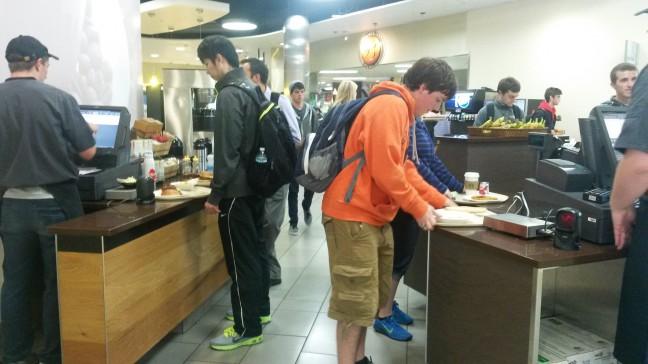They overflow from the black trash cans in dining halls and stack themselves on student dining trays, but the receipts from transactions at University of Wisconsin housing dining halls will soon be no more.
After two years of a student-lead solution to rid dining halls of receipts, UW Housing and Wisconsin Union Dining Services will now only print receipts upon request and for credit card transactions.
In just one week, roughly 100,000 receipts are printed for the entire housing dining division, Associate Director of Dining and Culinary Services for University Housing Julie Luke said.
According to Luke, UW spent approximately $36,000 annually on paper for receipts. Now that number is expected to drop about $6,000 or $7,000, thanks to the new receipt reduction plan that started this semester.
The plan was completely student driven as students interested in getting rid of these paper receipts found they were not serving their purpose, Luke said.
Kyla Kaplan, who then served on Associated Students of Madison’s sustainability committee, started the project her freshman year. Over the course of two years, she worked with physics professor Duncan Carlsmith and now graduated student Rachel Feil.
Kaplan, current vice chair of ASM, has continued to work on the project even after Feil’s graduation in 2014.
Having lived in Sellery as a freshman and eaten at Gordon Commons dining hall, it was clear to Kaplan the receipts printed off in the dining halls were a pain whether one was concerned about the environment or not.
Many students often threw away their receipts or left them on their trays. Students are always asked if they want their receipts, but they never keep them, Kaplan said.
“Sometimes they didn’t even take it at all and the cashier would throw it into trash bins … it was just a lot of accumulated waste,” Kaplan said.
There was much brainstorming that went into this project. They worked with many people who offered different points of views about the project, Kaplan said.
“We had a physics professor’s perspective, the Office of Sustainability’s point of view and ASM,” Kaplan said. “It was like three avenues working on one project, which is really exciting and really cool to see a group of people coming together to work towards a common goal.”
According to Kaplan, the group studied the receipts to first ensure they were BPA free, then considered the options of getting rid of receipts all together or creating electronic receipts. BPA or Bisphenol A is a synthetic chemical that can have an adverse affect on a person’s hormones.
By the end of her freshman year, the group had conducted a survey of students to gather their opinion of receipts, Kaplan said.
After receiving a large response of student’s feedback about the receipts, they were able to present to the university dining what students really thought about them, she said.
Luke, Kaplan said, really made the project possible. Luke presented the information and data the group had analyzed in the survey to her board. The board approved of a pilot program to be implemented in Smith Hall. The program turned out successful and the university approved the project for UW dining halls.
While Kaplan said they managed to get UW dining halls to stop printing receipts, the next step is to try to get unions on campus to stop as well.


